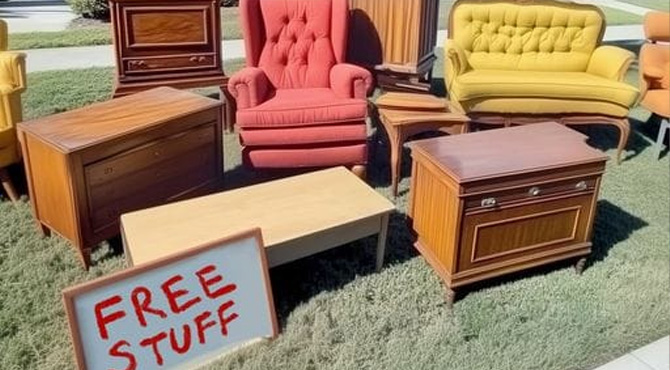After my husband and I decided to split, it felt like he turned into a completely different person overnight. The bitterness and hostility that emerged were overwhelming, and I couldn’t handle the emotional rollercoaster. So, I packed up and spent the weekend at my parents’ place, trying to clear my head and regain some semblance of calm.
Monday morning, with a heavy heart but a mind slightly clearer, I drove back to my house. As I turned into the driveway, my stomach dropped. My furniture was scattered all over the lawn, and a large “FREE STUFF” sign was propped up in front. Chairs, tables, and couches were strewn about like refuse, exposed to the elements.
I was stunned and furious, the kind of anger that makes your hands shake. I held back angry tears and pulled out my phone to call my ex. When he answered, his voice was infuriatingly calm.
“What’s wrong with you?” I demanded, trying to keep my voice steady. “Why is all my furniture on the lawn?”
His response was as childish as it was infuriating. “YOU WERE GOING TO SUE FOR ALL MY STUFF ANYWAY, SO YOU MIGHT AS WELL KNOW HOW IT FEELS — TO LOSE WHAT’S YOURS!”
I was speechless. My mind raced with a million thoughts, most of them involving the logistics of hauling all that furniture back inside by myself. It was clear that this was another petty revenge move from a man who seemed to have lost all sense of decency.
In my moment of desperation, I did something I didn’t expect from myself. I kicked the sign over and took a deep breath. I felt a surge of defiance, not against the absurdity of the situation but against the idea that I would let this petty act of vengeance get the best of me.
Instead of letting the frustration get the better of me, I did what I could to make the best of a bad situation. I took a few deep breaths and walked over to a neighbor’s house. I explained the situation, and to my surprise, they were more than willing to help. Word spread quickly through the neighborhood, and soon, a few friendly faces showed up to help.
Together, we moved the furniture back into the house, their kindness transforming a humiliating situation into something almost bearable. The support from the neighborhood was heartening, and as the last piece of furniture was hauled back inside, I felt a flicker of hope amidst the chaos.
As I was finishing up, I noticed a group of people standing at the edge of my lawn, their eyes on the furniture. They were clearly interested in the free stuff but seemed hesitant to take it. I approached them and explained the situation, and they were more than happy to help—most of them were just eager to support someone who had been wronged in such a blatant way.
By the end of the day, the furniture was back inside, and the lawn was clear. My ex’s petty revenge had backfired spectacularly. Instead of humiliating me, it had brought the community together and made me realize that I wasn’t alone.
The experience wasn’t just about moving furniture—it was about reclaiming my strength and dignity in the face of spite. It showed me that while some people might act out of pettiness, the kindness of others can turn even the worst situations into something unexpectedly positive.

1